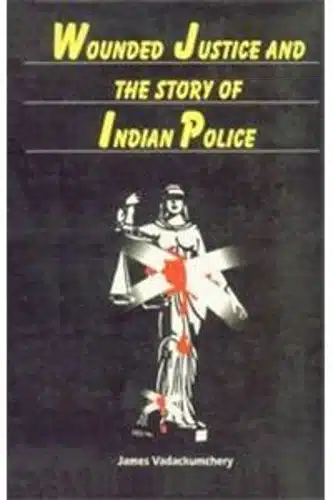
Save: 10%

Save: 50%
Wounded Justice and the Story of Indian Police
Publisher:
| Author:
| Language:
| Format:
Publisher:
Author:
Language:
Format:
₹400 ₹360
Save: 10%
In stock
Ships within:
In stock
| Weight | 223 g |
|---|---|
| Book Type |
ISBN:
Page Extent:
Indian Police Act came into existence in 1861. The objectives of the Act, through spelt out clearly in the Act, are at best suspicious. For, the law was enacted more for the maintenance of the British domain in India via police than administration of fair justice to the people. For, wounded justice administration has been in existence ever since the Indian Police Act – 1861 came into force. Every now and then, criticisms are levelled against the police and against police strategies. Crimes have been constantly onthe increase and conviction rate on the decrease. The story of Indian police is a story of wounded justice administration and it can be injustice or miscarriage of justice (?) Police became unpopular with the public and popular with the vested interest. Justice meant goodness, reighteousness and truth for the British, but it was not so for them for Indians. For, the British never wanted it to be so in India. When India became independent, the British left the Country and democracy was established. In Indian democracy, the political parties which came into power from time to time ruled the police just like the British did here. They too wanted to maintain their domain through the police. In order to please the Government in power, the police resorted to everything and ultimately, it has been observed that the police failed to administer proper justice to the people. Just like the white men occupied important positions in police during the colonial rule, officers who are the yes man of the political party in power occupied strategic posts after India became indepedent. Now, there is a move to divorce the police from political inteference as the nexus between the political parties and the police often becomes a powerful cause for administration of wounded justice.
Table of Contents
Chapter 1: Introduction,
Chapter 2: Wounded Justice and Police Under the British,
Chapter 3: Wounded Justice: The Police Legacy or People’s Curse?,
Chapter 4: Wounded Justice: The Police Pragmatism or People’s Fatalism?,
Chapter 5: Wounded Justice: The Police Instincts and the People’s Expectations,
Chapter 6: Wounded Justice: An Age Old Evil and Public Reaction,
Chapter 7: Wounded Justice: Police Commission and Politicians,
Chapter 8: Wounded Justice: National Police Commission-Before and After,
Chapter 9: Wounded Justice: Philosophies and Principles,
Chapter 10: Wounded Justice and Committee on Police Reforms: Looking Ahead.
Indian Police Act came into existence in 1861. The objectives of the Act, through spelt out clearly in the Act, are at best suspicious. For, the law was enacted more for the maintenance of the British domain in India via police than administration of fair justice to the people. For, wounded justice administration has been in existence ever since the Indian Police Act – 1861 came into force. Every now and then, criticisms are levelled against the police and against police strategies. Crimes have been constantly onthe increase and conviction rate on the decrease. The story of Indian police is a story of wounded justice administration and it can be injustice or miscarriage of justice (?) Police became unpopular with the public and popular with the vested interest. Justice meant goodness, reighteousness and truth for the British, but it was not so for them for Indians. For, the British never wanted it to be so in India. When India became independent, the British left the Country and democracy was established. In Indian democracy, the political parties which came into power from time to time ruled the police just like the British did here. They too wanted to maintain their domain through the police. In order to please the Government in power, the police resorted to everything and ultimately, it has been observed that the police failed to administer proper justice to the people. Just like the white men occupied important positions in police during the colonial rule, officers who are the yes man of the political party in power occupied strategic posts after India became indepedent. Now, there is a move to divorce the police from political inteference as the nexus between the political parties and the police often becomes a powerful cause for administration of wounded justice.
Table of Contents
Chapter 1: Introduction,
Chapter 2: Wounded Justice and Police Under the British,
Chapter 3: Wounded Justice: The Police Legacy or People’s Curse?,
Chapter 4: Wounded Justice: The Police Pragmatism or People’s Fatalism?,
Chapter 5: Wounded Justice: The Police Instincts and the People’s Expectations,
Chapter 6: Wounded Justice: An Age Old Evil and Public Reaction,
Chapter 7: Wounded Justice: Police Commission and Politicians,
Chapter 8: Wounded Justice: National Police Commission-Before and After,
Chapter 9: Wounded Justice: Philosophies and Principles,
Chapter 10: Wounded Justice and Committee on Police Reforms: Looking Ahead.
About Author
Reviews
There are no reviews yet.
Related products
Random Reminiscences of a Police Officer Under Two Flags
Save: 30%
Policing in the 21st Century: Myth, Realities and Challenges
Save: 10%
RELATED PRODUCTS
Policing in the 21st Century: Myth, Realities and Challenges
Save: 10%
Random Reminiscences of a Police Officer Under Two Flags
Save: 30%



Reviews
There are no reviews yet.